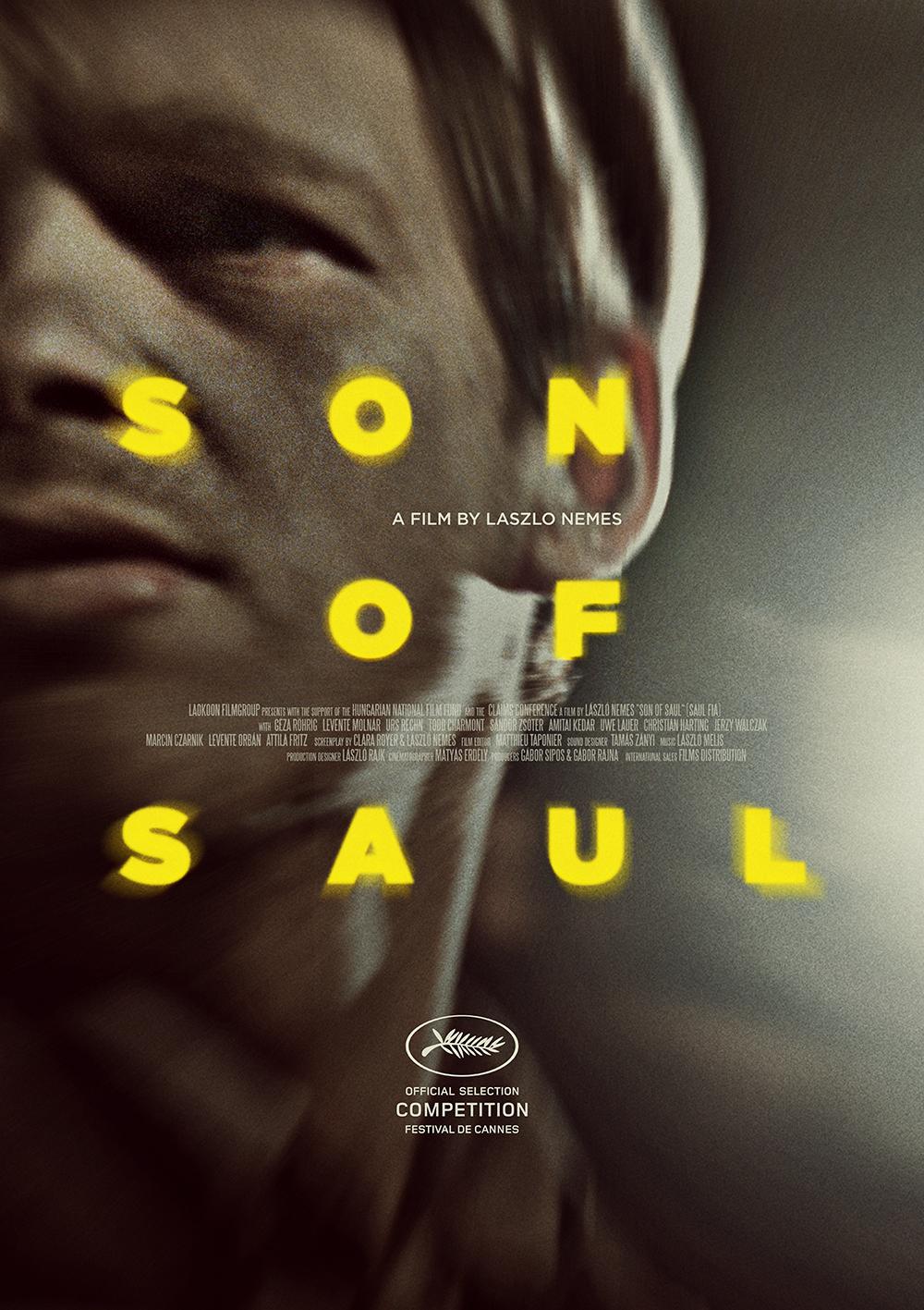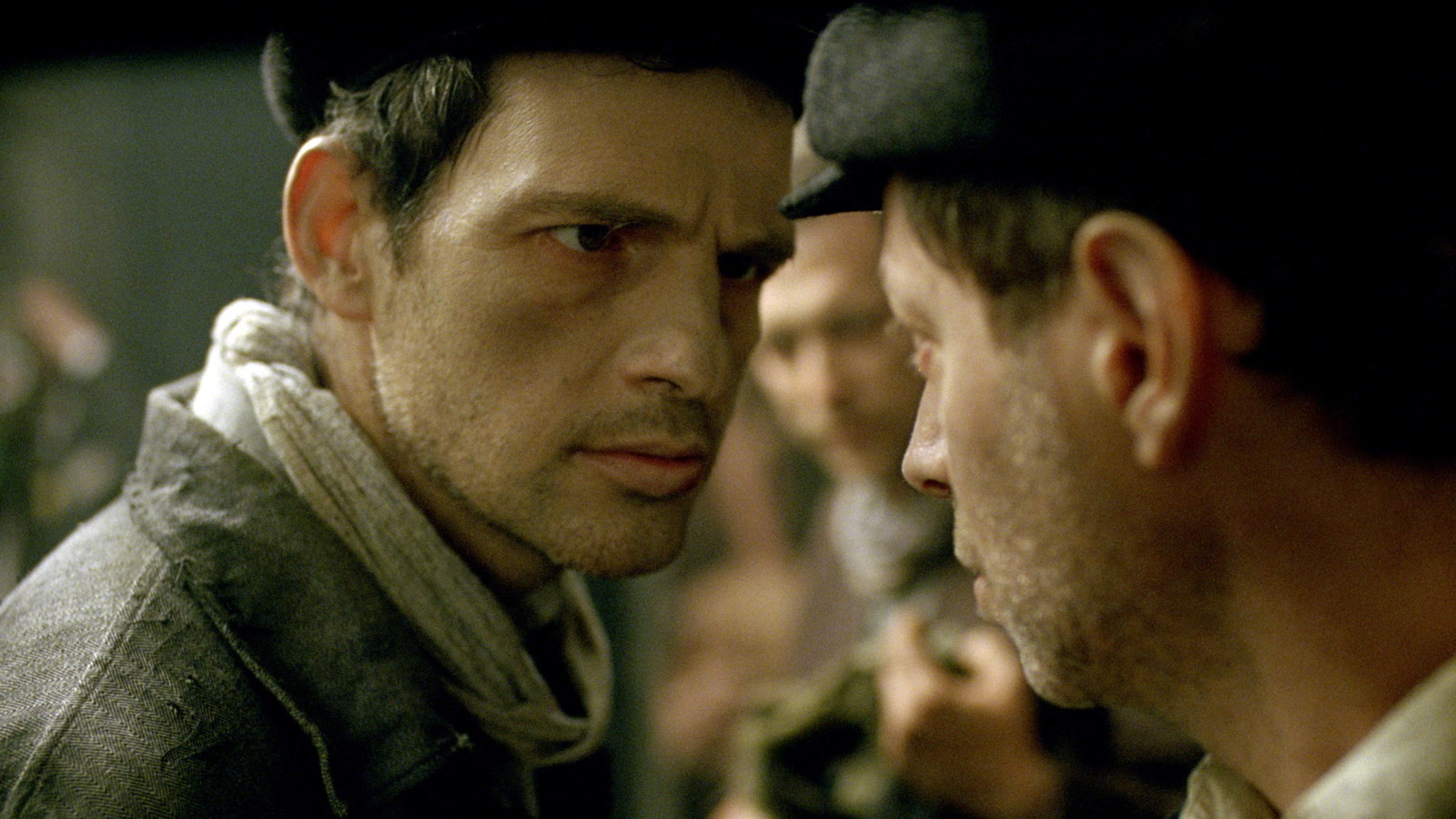Interview: Director and Star of 'Son of Saul' on Making Art in a Politically Correct World
 Saturday, December 19, 2015 at 3:33PM
Saturday, December 19, 2015 at 3:33PM  Jose here. The evils of the Nazi regime have been documented in myriad ways, and in practically every medium possible. Film in particular, has created a subgenre that consists of harrowing stories about concentration camps, the diabolical genocide of the Jews, and other events that put all the human race under a shameful light. However, perhaps because of Hollywood’s tendency to overpraise the human spirit, and its relentless need to “inspire”, Holocaust films have become a “niche” meant to help actors and directors win awards. Holocaust films in a nutshell always go for the emotional and rarely, if ever, attempt to touch the intellectual.
Jose here. The evils of the Nazi regime have been documented in myriad ways, and in practically every medium possible. Film in particular, has created a subgenre that consists of harrowing stories about concentration camps, the diabolical genocide of the Jews, and other events that put all the human race under a shameful light. However, perhaps because of Hollywood’s tendency to overpraise the human spirit, and its relentless need to “inspire”, Holocaust films have become a “niche” meant to help actors and directors win awards. Holocaust films in a nutshell always go for the emotional and rarely, if ever, attempt to touch the intellectual.
Enter first time director László Nemes, who caught Cannes by surprise with his unique Son of Saul, which has just opened in US theaters, a film that dispenses of each and every cliché you’ve seen played in every other Holocaust movie. There are no string-filled overwrought scores, no movie stars losing weight, gaining accents or donning beards, and most surprisingly, there are no attempts at oversimplifying the Holocaust as anything other than a series of personal infernos lived in a collective reality. The inner hell in this case, is that of Auschwitz prisoner Saul (Géza Röhrig), a Sonderkommando member, who one day makes a gruesome discovery that drives him to make a decision that might have deadly results.
The interview after the jump...
Géza Röhrig and László Nemes. Credit: Jose Solis
I had the opportunity to sit down with Nemes and Röhrig, who weren’t just eloquent when it came to discussing the technical aspects of the film, but also spoke with authority about philosophical and ethical matters. Speaking with them made it clear, no other two people would have been able to make Son of Saul.
Our conversation follows...
JOSE: Son of Saul is very bold in terms of storytelling and technique. Would you say you were this bold because it was your first film? Or are you planning on pursuing different storytelling methods as bold as this one?
LÁSZLÓ NEMES: I wish! When you make your first feature you don’t really understand the dangers, you’re not aware of the dangers. You need to be unconscious of the dangers of failing with the film and in your career. I was very anxious when I made the film, but I knew it was also a prototype, it’s the kind of film we have to invent as we go. We wanted to make it that way though, we knew it would be a difficult and ambitious project, and it was constantly frustrating because I had a sense when I was filming it, that I wasn’t succeeding in getting what I wanted. I guess this frustration is part of the game, I hope in the future I can be as bold. I wish I could be on the edge once more.
JOSE: Most films about the Holocaust tend to be very romantic, something like Schindler’s List for instance, focuses on one person saving thousands, or something like Life is Beautiful, in which a father turns a camp into an amusement park for his son. In Son of Saul, you remind us that whether we like it or not, selfishness is an essential part of being human…
LÁSZLÓ NEMES: ...very true.
JOSE: ...and movies about the Holocaust completely forget this.
LÁSZLÓ: Yeah, and being selfish doesn’t mean that you’re evil. The thing about survival is that survivors, in a sense, felt bad for having survived, because of the things they had to do in order to stay alive. The moral issue is with those who constructed the camps, not with those who were transported there and had to do terrible things to survive. Surviving was the exception, so I wanted to go back and show what it meant to be a human being in the middle of it, and not have this post-war intellectual view in all the emotions and projections. In the concentration camp you couldn’t think.
GÉZA RÖHRIG: I couldn’t agree with you more. They always add flavors to the Holocaust because in its raw reality they find it indigestible, so they make it nice and put some sugar on it. They water down stories in a way that aren’t fair to the memory of all the people who were murdered. The system was indifferent to the point that there were no Germans around, in the very same way in Japan people are now proud of making cars without humans, in the camps, Germans were proud because they killed without touching the people. These people who were involved in an indirect way, people who were manufacturing the poison they were using to gas the Jews, it’s troubling how they were in the heart of the European civilization, right there in front of everyone. There’s no doubt the Germans were fully aware of what they were doing it, Dachau was in the outskirts of Munich, not in rural Poland, the camps were near centers of civilization…
It’s important to talk about the film’s achievements, but also about the topic, and younger generations especially, who think they’re watching propaganda, once they sit in the movie, they get it. This is the reality we’re living in now, this used to be Europe, but look at our world now, genocide is still happening. 
Going back to how you touch the subject matter, American films have become very politically correct and there is this notion of community being at the center of everything, but in Son of Saul, it’s the individual who is at the center. As artists, do you think it’s really ever possible to make works that are politically correct and also transcendental art at the same time?
LÁSZLÓ: It’s difficult it seems. In Europe and the US it seems that films have to have a message that is clearly understood, it’s like we’re in an era of public education, not filmmaking. I think that filmmaking is something that has to rely on the viewer and their imagination. It has to have its zone of darkness and unknown, otherwise it’s all planned out and we’re on some safe road. Specifically Holocaust films are de-codified as safe road experiences where the good guy is here, and the bad guy is there, the iconography and dramaturgy are constructed in a way that all they do is reassure the audience.
Holocaust films are in effect a history of oversimplified cinema, which is actually more and more about educating the audience in a sense that’s completely counterproductive. I think that cinema can really talk to the individual, it can talk about metaphysics and raise questions of bigger importance than just social or political issues. Cinema is less and less doing that. I’m more attracted to asking universal questions, rather than answering the questions of those who ask me where I’m coming from. Even in the financing stage, people asked me why I was making a film about the Holocaust and not a film about myself. My life is not that interesting, and also what is wrong in this world in which people are so narcissistic that they not only talk about themselves, but also make others talk about themselves.
GÉZA: I share your sentiment in literature and film. Art in general is iconoclastic, it smashes idols, and while I understand the purpose of political correctness, it can not keep up with life. Once it consists of a set of rules, it’s humorless, it goes against spirit and inspiration. It’s dumb and basically I think, whoever aspires to do art, willingly or not, will run into some walls and then you know you’re doing the right thing. If you go the sterile, political correct way there’s no way you would be able to be authentic.
The film has had such a great run at festivals and now it’s Hungary’s Oscar submission. What would a nomination mean for the film?
LÁSZLÓ: When we made this film we were trying to avoid the mosquitoes around us. Mosquitoes were our main concern.
GÉZA: It was summertime and we were shooting next to the Danube, so there were lots of mosquitoes.
LÁSZLÓ: In some scenes you can see them...but anyway, there’s a feeling of strange fate. This is our first movie, so what are you talking about with this Cannes, the film playing in 60 countries and Oscar campaigns? There’s a sense of the film living its own life, and it’s getting a little bit overwhelming, but at the same time it’s good for the film. I’m getting a little dizzy, but I’m not complaining.
GÉZA: It’s a strange thing to stand in a cocktail party and talk about the Holocaust. This is part of how this industry works, you show up to talk about your film, or you’re going to be snubbed.

Son of Saul is now playing in select cities. We previously reviewed the film here.
It is one of nine Foreign Film Finalists
 Directors,
Directors,  Geza Rohrig,
Geza Rohrig,  Hungary,
Hungary,  Laszlo Nemes,
Laszlo Nemes,  Oscars (15),
Oscars (15),  Son of Saul,
Son of Saul,  WW II,
WW II,  interview
interview 


Reader Comments (4)
If nominated, the winner. The film is excellent and these two guys have been very humble, eloquent and charming on the circuit. Plus the subject matter. Great interview, Jose.
I bet this actor is gonna be a villain in a James Bond movie, maybe the next. They're gonna put a scar in his face.
Stunning movie, the best of the year and one of the decade's finest.
It was such an immersive experience that I had to remind myself it was just a movie at times. I was curious to know whether Géza suffered from PTSD to some degree after the movie wrapped. I loved hearing what Géza had to say in the Q&A I attended and it made me appreciate the movie so much more and really see it from many different perspectives, both in terms of the filmmaking and the subject matter. He revealed that he and the DP took dance classes together so they could be in synch for the shoot, since he is practically in every frame and usually at a certain distance. I also loved his comments about the fact the background is out-of-focus and the camera never really shows anything graphic just so us, as viewers, can individually imagine what his surroundings are like.